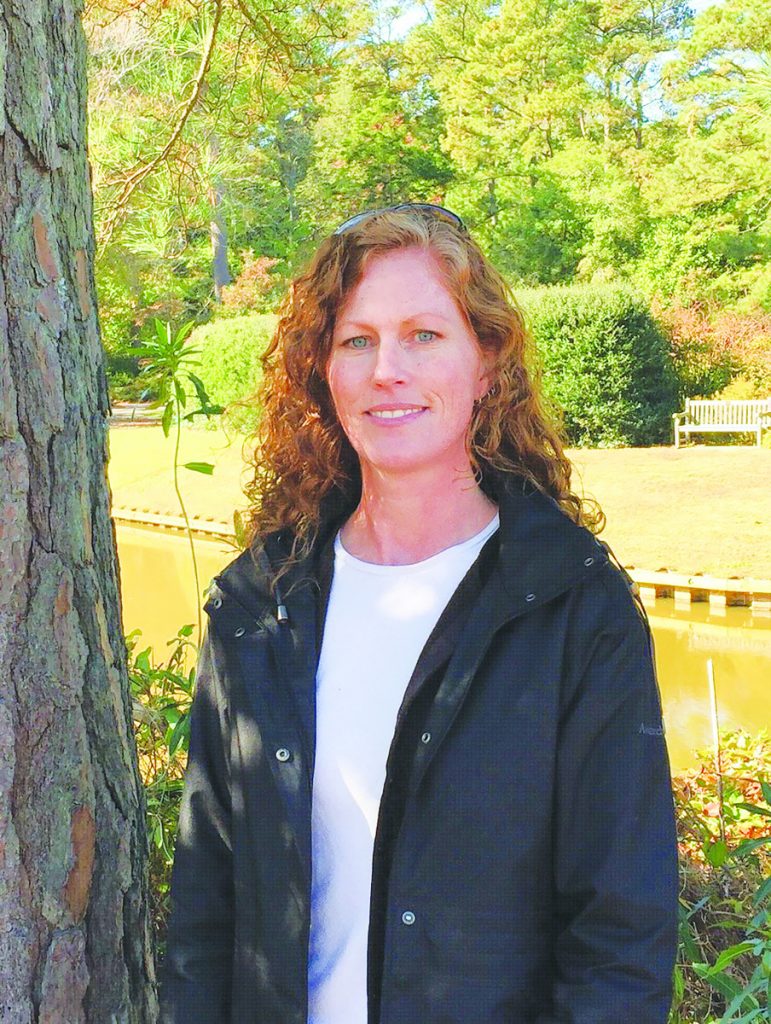
Mariia Novoselia
Staff writer
In a world where approximately 40% of plants are endangered, growing a greener garden may just save the day.
Theresa Augustin, vice president of education at Norfolk Botanical Garden, has been around gardens since she was 1 year old. From curiously observing blooming azaleas as a child, to applying for an internship as a college student and being the first director of environmental engagement and outreach at NBG, the garden has always been a huge part of Augustin’s life. Her Brown Bag lecture, organized by the Bird, Tree & Garden Club, is at 12:15 p.m. today at Smith Wilkes Hall.
We are sharing this space with nature; we’re not at the center of it and we always have to be mindful of that. I think that’s what good environmental stewardship is – it’s realizing that it’s a collective out here”
THERESA AUGUSTIN
Vice President of Education,
Norfolk Botanical Garden
With her “Growing a greener botanical garden” talk, Augustin said, she hopes to inspire people to take action to help the environment and “give them a little hope and a little optimism that there are businesses and folks out there trying to do the right thing.” She will talk about NBG and how they started their journey to being greener and eco-friendlier. She will cover their institutional policies, as well as plans of the organization.
Earlier this year, Fodors recognized NBG as one of the 12 best botanical gardens across the United States.
“(Working at NBG) has been my ‘plan A’ in terms of a career,” Augustin said. “I just love every aspect of it.”
During her first years at the organization, she maintained gardens. Now, she engages with varied audiences to promote sustainability and raise eco-consciousness.
“When I started, I dug in the dirt. … Now I’m in a position where I can influence what we teach the public, how we engage with the public, and the type of information we put out there — so we can put environmental education first,” she said.
At the outset of one’s quest to become an environmental steward, Augustin suggests asking yourself one question: Am I generating more waste than I need to right now?
Environmental stewardship, she explained, entails how you care for the environment. NBG covers 75 acres, which is “a huge habitat.”
“We are sharing this space with nature; we’re not at the center of it and we always have to be mindful of that. I think that’s what good environmental stewardship is – it’s realizing that it’s a collective out here,” Augustin said.
When it comes to gardening, she said, being an environmental steward involves being mindful of the types of plants people grow and the chemicals they use to tend to them.
Another part of environmental stewardship, Augustin said, is celebrating advances and successes in the pursuit of sustainability. The best way to get people excited about the environment is to share your enthusiasm with others. They will also spread the word, and then all of a sudden, she said, everyone is a great steward.
“Environmental stewardship … is a journey, and when you take the time to explain why you’re doing what you’re doing, then you get 100% buy-in,” Augustine said. “I think everybody inherently wants to be right by the environment. They just need to be shown how.”
Human activity, Augustin said, has created a lot of trouble for our planet. Humans, therefore, need to do as much as possible to make up for it. A common misconception that Augustin has noticed over the years of working in the field is that it is difficult to be eco-friendly. She said there are usually a couple of things that help the environment that people do even without realizing.
“Some folks have been composting, or they reuse leaves in their yard, and they don’t realize that that counts towards being a steward to the environment,” she said.
On top of that, most gardens “have an incredibly important role in our ecosystem,” she said. For that reason, growing one also contributes to the wellbeing of the environment. She said gardens are a good food source, as well as a shelter source for wildlife; a walk in the garden can also help people decompress after a long day.
“I think we just get charmed by the beauty and forget that there is a little depth to (gardens),” Augustin said.
NBG has implemented a number of policies on the path to sustainability. Augustin said perhaps the biggest shift came with the ban of single-use plastics, established in 2018. Saying “no” to plastic water bottles was an especially challenging step.
“It’s kind of ingrained in everyone to grab a bottle of water when you go out and about,” she said.
Instead of single-use plastic containers, the NGB community is opting for reusable water bottles.
Another project of NBG that Augustin is proud of is the transition to green energy. Last winter, she said, the organization installed solar panels, which significantly reduced the cost of their energy bills.
Their “Garden of Tomorrow” campaign, which the NBG team is working on right now, includes creating a new welcome center, a conservatory and a learning lab. When finished, it will be NBG’s largest expansion project to date, Augustin said.
“This is our next chapter in the garden story where the environment will be put first,” she said.
Augustin said it is important to remember that all the changes that NBG have implemented constitute a process and require collaboration. Starting small, with “a low-hanging fruit,” she said, the organization built their way to bigger endeavors like the solar panels.
“Collective effort is what matters and will affect change,” Augustine said. “Day by day, … effort by effort, it all adds up no matter how small it is; it’s scalable.”




